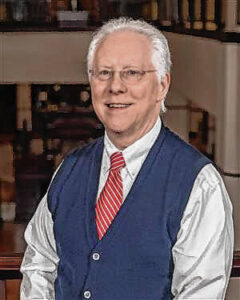A Bartholomew Consolidated School Corp. board member who has served more than 10 years and a local parent are seeking the board’s District 2 seat.
Incumbent Rich Stenner is seeking re-election. His opponent is newcomer Roy West. Dona Lynn Ownings previously filed to run for District 2 as well but later withdrew her candidacy.
Stenner and West were asked the same five questions and their responses were as follows.
Q: What is the number one thing that motivated you to run for this office?
“I want to continue to try to do our best for students and the teachers in the classroom,” said Stenner.
West said he is running due to “lack of communication” from the school board. He said only one school board member has replied to his questions and concerns.
“I think they probably, unfortunately, fall into the trap as they think everyone knows what they know, which isn’t the case, right?” he said. “And I don’t know that they’re even necessarily intentionally not communicating well. I think a lot of people can fall into the trap of thinking they are, when they’re truly not. And having a communication background, I think that’s one of the big things that I can bring.”
Q: Do you think teachers are being compensated adequately? What can BCSC do to improve teacher retention and recruitment?
Stenner believes that the school corporation has “made steps in the right direction” in terms of compensation and support.
“I think we need to continue to do the things that we’ve started and take them further,” he said. “So the best retention program would be supporting teachers and paying them adequately, giving them the tools they need and the support they need, and the pay that they deserve.”
West said that research should be a major part of determining teachers’ pay.
“If you just asked me, ‘Hey, are teachers paid enough?’ No, they’re not,” he said. “They have a really important job. And when you compare it to other jobs in the community versus their importance — in my opinion, they’re underpaid, right? And so I think increasing our teacher pay to the appropriate level would be one of the main things the board can do.”
It’s a question of how you define the appropriate level of pay, he said. The school corporation should benchmark itself against nearby communities and similarly sized school districts within the state to determine the answer.
West added that raising taxes should be “the last solution” for increasing teacher pay, and the school board should pursue other avenues first, such as grants and fundraising.
Q: What can the school corporation do to address the ongoing impacts of the pandemic, both in terms of academic recovery and mental health?
“I think a lot of what we can do to address the impact is going to be happening in the classroom,” said Stenner. “And it’s going to involve what we’ve been talking about already. It’s going to involve the teachers and doing our best to catch students up with the state standards for their grade level.”
In regards to mental health, he said that there are skills such as managing one’s emotions and working with others that are best learned in a classroom. These skills should hopefully prepare students to deal with mental health issues. He added that when that’s not enough, the school corporation also has specialists at most or all of its buildings through the Counseling Counts program.
West said that while COVID-19 had a major impact on mental wellness, he’s not sure it’s the “main culprit.” He feels that social media is a major factor, and parents also play a role.
“The pressures that kids are under now, compared to previous generations are a lot more just because everything in this world’s fast-paced, right?” said West. “Everything’s instant. We’re becoming a culture of instant gratification.”
He feels that limiting phone use in schools could potentially help. He also said working to create relationships is important.
In regards to academic recovery, he said, “I don’t know that there’s a whole lot extra that you can do beyond checking to see, reading the current benchmarks that are in place and trying to improve upon that. Sometimes you lose a little bit of time from this or that, and it’s not necessarily going to be able to be made up. I think I’d be real careful to try to cram knowledge into students for tests’ sake as opposed to making sure they really learn their life skills and really learn and absorb the knowledge.”
Q: Over the past couple of years, the relationships between many local school boards and community members have become strained and, in some cases, combative. At a local level, what can both parties do to promote good relations and communication?
Stenner said that the most important thing is listening.
“I think the school administrators and school board members could be doing a better job of listening to parents and taxpayers and constituents,” he said. “There’s always room for improvement. And I don’t mean to give assignments out to other people, but if there are two sides here, then both sides can work on their listening skills.”
He added school board meetings are business meetings where the board is working to make decisions, which “has hindered communication.” It might be helpful, he said, to have informal meetings on topics such as education and schools, with these sessions having a less rigid format.
West reiterated that he believes the board could do a better job of communicating with parents.
“Nobody likes to be told they’re not getting their way, but if it’s explained clearly and concisely why a choice or decision was made, I think most people — while they may or may not agree with it — they can understand and comprehend why the choice was made,” he said.
He also said that both parties need to be civil. Additionally, it may also be helpful to clarify the school board’s role and how it works.
Q: How do you define critical race theory, and what is your opinion on it?
“With a limited amount of understanding, I believe it’s a framework for looking at relationships in the U.S. between people of different races,” said Stenner. “Again, I’d emphasize that I’m not an expert. I’m not sure that it’s something that I’ve come across during my experience as a board member or something that I really am going to have to wrestle with as a school board member.”
He said he does not have a personal opinion on critical race theory.
West said that CRT is the work of social rights activists and civil rights scholars to examine “different laws and different movements and basically social concepts of race and ethnicity.”
He said that it doesn’t belong in K-12 education and is more appropriate for college, as younger students don’t necessarily have the life experiences or “mental capacity” to comprehend this curriculum.
 Rich Stenner
Rich Stenner





